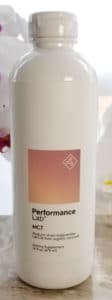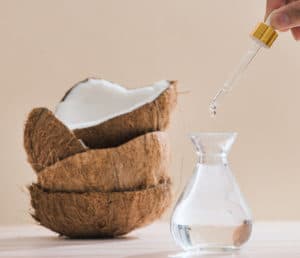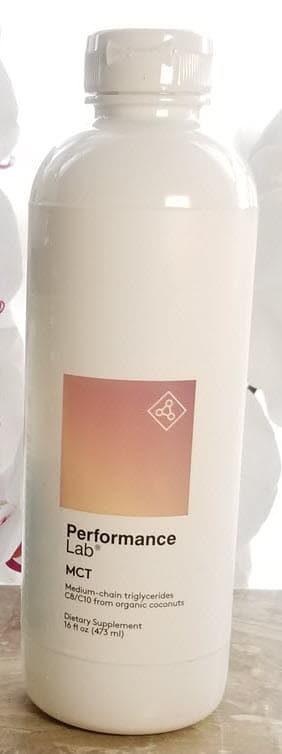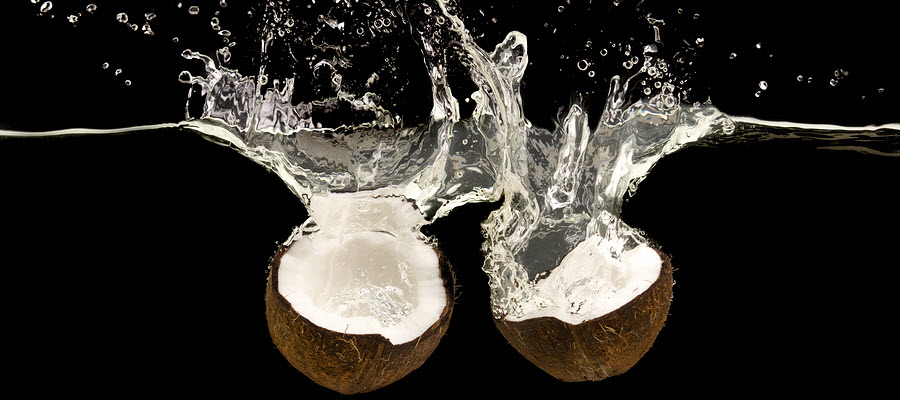Table of Contents
This is my Performance Lab® MCT Review. Let me explain … Your brain makes up only 2% of your total body weight. But it consumes about 20% of your total body energy. Energy that is derived from glucose.
This glucose comes from carbohydrates you get from food. It’s used as energy for your brain and body or stored as glycogen in your liver and muscle tissue.
Energy comes courtesy glucose metabolism which provides fuel for ATP fuel synthesis within mitochondria.
In your brain this energy powers neurons and other brain cell maintenance and contributes to neurotransmitter synthesis.
When your body and brain cannot get carbohydrates from food, your liver becomes the sole provider of glucose to feed your hungry brain. But this is a temporary solution.
When the glucose runs out either from dieting, starvation or age-related disruptions in glucose metabolism, you need another fuel source.
If left unchecked, it leads to one of several neurodegenerative diseases.[i]
The good news is your body has a built-in backup plan when the glucose runs out. This alternate energy fuel supply is called ketone bodies which your liver derives from fatty acids in your diet, or body fat.
These ketones (beta-hydroxybutyric acid, acetoacetate and acetone) are released by your liver and taken up by your brain. Then shuttled into mitochondria to be used in the citric acid cycle to create adenosine triphosphate (ATP).[ii]
You can get the ketones your brain needs by eating a very high fat, low carbohydrate ketogenic diet, but it’s not necessary.
Because the medium-chain fatty acids (MCFAs), also called medium-chain triglycerides (MCTs) in coconut oil can provide these ketones directly to help create ATP in brain cell mitochondria.[iii]
Best MCT Oil for ketones
Coconut oil contains up to 60% medium-chain triglycerides (MCTs); caprylic acid C-8 (8%), capric acid, C-10 (7%), lauric  acid C-12 (49%), myristic acid C-14 (8%), palmitic acid C-16 (8%), stearic acid C-18 (2%), oleic acid C-18 (6%) and 2% of C-18 linoleic acid.
acid C-12 (49%), myristic acid C-14 (8%), palmitic acid C-16 (8%), stearic acid C-18 (2%), oleic acid C-18 (6%) and 2% of C-18 linoleic acid.
MCT Oil that works as a nootropic is made by hydrolyzing coconut oil and esterifying the fatty acids shorter than lauric acid (C-12) with glycerol. In other words, the best MCT Oil should contain only caprylic acid C-8 and capric acid C-10.
But since MCT Oil has become popular for nootropic stacks and ketogenic diets, manufacturers have started to produce a supplement using only caprylic acid C-8. Which is more expensive and misses out on the benefits of capric acid C-10.
And some even produce a type of MCT oil that contains lauric acid C-12 —usually 30%.
The thing is recent research shows that lauric acid C-12, even though classified as a medium-chain fatty acid (MCT), acts more like a long-chain fatty acid.
Because it tends to be absorbed via the lymphatic system instead of going straight to your liver or brain for energy production.
It takes longer for lauric acid C-12 to convert to ketones than caprylic acid (C-8) and capric acid (C-10).
And using unrefined coconut oil or MCT oil containing lauric acid C-12 results in a slower energy response because of a less prominent rise in ketone bodies.[iv]
The best MCT Oil for nootropic use contains both caprylic acid C-8 and capric acid C-10.
Only a very few supplement companies produce this type of refined, high quality MCT Oil. And only one uses 100% verified organic coconuts.
It is called Performance Lab® MCT and I invite you to read on for my full review below …
My MCT Oil criteria
 I use organic unrefined coconut oil or MCT Oil at least 3-times per day. Each time I take my nootropic stack to ensure fat-soluble supplements are absorbed.
I use organic unrefined coconut oil or MCT Oil at least 3-times per day. Each time I take my nootropic stack to ensure fat-soluble supplements are absorbed.
I lived in the Caribbean for many years and am now in Miami. So I’m fussy about my coconuts and MCT Oil.
My MCT Oil needs to:
- contain both caprylic acid C-8 and capric acid C-10
- not contain lauric acid C-12
- be 100% medium-chain triglycerides (MCTs) only
- be non-GMO and certified organic
- not be contaminated with gluten, soy, colorants, preservative or other additives
- expeller-pressed or centrifuge extraction only
- use verifiable and pure fresh, white coconut flesh, not copra (dried coconut)
I’ve used unrefined organic coconut oil as a natural healthy fat source for years.
And naturally, I have been aware of various MCT Oil and brain octane oil products offered by several supplement manufacturers.
But not a single company produced a certified organic MCT Oil containing perfectly calibrated amounts of caprylic acid C-8 and capric acid C-10.
Until now …
Discovering Performance Lab®
I use a lot of nootropic supplements every day. The list has grown as I learn more about how my body and brain work. And research has revealed what it takes for me to perform at the levels I want to live life.
But there came a point when I wondered if there was some way I could consolidate my daily supplement regimen. And take fewer capsules from fewer companies to maintain the way I feel and perform.
Then I discovered a new supplement line created and produced by the sister company who makes my favorite pre-formulated nootropic stack; Mind Lab Pro®.
Who Makes Performance Lab®?
Performance Lab® is a new line of supplements designed and produced by the same folk who designed Mind Lab Pro®.
I’ve been using Mind Lab Pro for over 5 years and have come to trust the company. And the quality of their supplements.
Performance Lab® is based in the U.K. and manufactures all their supplements in the USA.
Performance Lab® NutriGenesis Multi is the foundation of their new supplement line.
The company’s multivitamin for men and women supplies the essential vitamins and minerals required for overall health. Nutrients that may be missing from your diet.
Their new Performance Lab® MCT supports the benefits of the universal cognitive enhancer I use – Mind Lab Pro®.
Some of the Mind Lab Pro formula contains fat-soluble compounds like found in Bacopa Monnieri and Lion’s Mane Mushroom. And require a healthy fat such as Performance Lab® MCT oil for absorption to get their full nootropic benefit.
An added benefit of using MCT Oil with Mind Lab Pro is more brain cell energy from quicker ATP synthesis using ketones instead of glucose.
Performance Lab® MCT Ingredients
Performance Lab® MCT is pure, organic MCT oil extracted from 100% organic non-GMO coconuts.
This MCT oil is calibrated to provide exactly 7.1 g (60%) Caprylic Acid (C-8) and 5.1 g (40%) Capric Acid (C-10) in each tablespoon dose.
Performance Lab® MCT Dosage
Recommended dosage of Performance Lab® MCT oil is 1-tablespoon 3-times per day. Or each time you take a fat-soluble nootropic supplement.
How Performance Lab® MCT Works in Real Life
 Using Performance Lab® MCT quickly provides ketones your mitochondria use for ATP synthesis. For more cellular energy and less fatigue.
Using Performance Lab® MCT quickly provides ketones your mitochondria use for ATP synthesis. For more cellular energy and less fatigue.
This MCT oil also helps the bioavailability of any fat-soluble nootropics in your stack. These supplements typically have a label with instructions suggesting you take it “with a meal”.
Neurohackers report that MCT oil increases alertness and focus. Others say their brain is ‘clearer’ and they feel energized throughout the day.
Some say they feel an improvement in mood. Appetite is suppressed and their happiness level is elevated for about 4 hours.
Pros & Cons of Performance Lab® MCT
 Pros
Pros
- Calibrated amounts of Caprylic Acid (60%) and Capric Acid (40%)
- Made from 100% organic non-GMO coconuts
- Extracted with hexane-free technology and triple distilled for purity
- Avoids using cheaper Lauric Acid (C-12) which is not a MCT
- No added ingredients
- Tested prior to bottling for allergens, GMOs, microbes, pesticides, herbicides, heavy metals, and other contaminants
- Tested again to confirm potency, purity, and activity after bottling
- Empty bottle, money-back guarantee (less shipping)
- 24/7 customer support
Cons
- Only available on their website
- Premium price
I honestly can’t think of any other cons for this organic MCT Oil supplement. It works for me and I truly hope it works as well for you.
Performance Lab® sells Performance Lab® MCT at a premium price. But here’s how it compares to its direct competition.
Performance Lab® MCT oil is superior to Bulletproof® Brain Octane Oil which is not organic and contains only Caprylic Acid (C-8).
And Bulletproof® XCT Oil which does provide both Caprylic Acid (C-8) and Capric Acid (C-10). But is not organic with no guarantee of calibrated amounts of C-8 /C-10.
Onnit Labs® offers MCT Oil but it’s not organic and contains Caprylic Acid (C-8), Capric Acid (C-10), with Lauric Acid (C-12) which is not really a true medium-chain triglyceride (MCT).
Try: Performance Lab® MCT
Nootropics Expert Recommendation
 I recommend the use of Performance Lab® MCT oil as a nootropic.
I recommend the use of Performance Lab® MCT oil as a nootropic.
Performance Lab® MCT is a premium-priced MCT oil. But is obviously superior to its direct competition who do not offer an organic product. And no indication or way to verify their testing procedures for purity.
The biggest advantage with Performance Lab® MCT oil is rapid absorption as an energy source. Converting quickly and efficiently into ketones for mitochondrial energy synthesis.
Performance Lab® MCT pairs well with the company’s NutriGenesis Multi, and Vision formulas and Mind Lab Pro® which all need a healthy source of fat for absorption.
Performance Lab® MCT is particularly effective for a Keto, paleo, low-carb, or intermittent fasting diet.
And Performance Lab® MCT stacks well with any of the fat-soluble nootropics in your stack. To ensure bioavailability and that you get the full intended benefit from your nootropic stack.
Performance Lab® only offers their Performance Lab® products including their MCT Oil on their website. You will not find it on Amazon or other online retailers.
Performance Lab® goes the extra mile by using organic, non-GMO coconuts. And oil extracted using non-toxic, hexane-free technology that’s triple distilled for purity and taste.
And Performance Lab® also offers a risk-free, “empty bottle”, money-back guarantee if you are not happy with their product.
If you are looking for a high quality MCT oil – I recommend giving Performance Lab® MCT a try.
If you’d like to try Performance Lab® MCT, or learn more about this exceptional line of supplements, please go to their website and have a look around. And while you’re there, get Performance Lab® MCT.








Join The Discussion - 3 comments
Ray
January 29, 2020
Thanks for the advice, I might try the extra virgin olive oil as I’ve been trying coconut oil for some time and have also tried reducing the dose but I still get the same issue. Thanks for your help. I love your site so much fantastic info.
Ray
January 29, 2020
Great article! Do you have any guidance on those that can’t take coconut oil? I do like coconut oil, but when I take some with my stack, I have to stay very cose to a toilet, it’s a little difficult to navigate at times. Any suggestions?
David Tomen
January 29, 2020
Ray, that is a fairly common side effect when just starting out with coconut oil or MCT Oil. Only advice I can offer is try half the amount and see if that works.
If it does work, continue to use the smaller dose until your system gets accustomed to it. Then raise it a bit until you can use a tablespoon with no adverse effects.
Worst case is switch to another healthy oil like extra virgin olive oil.